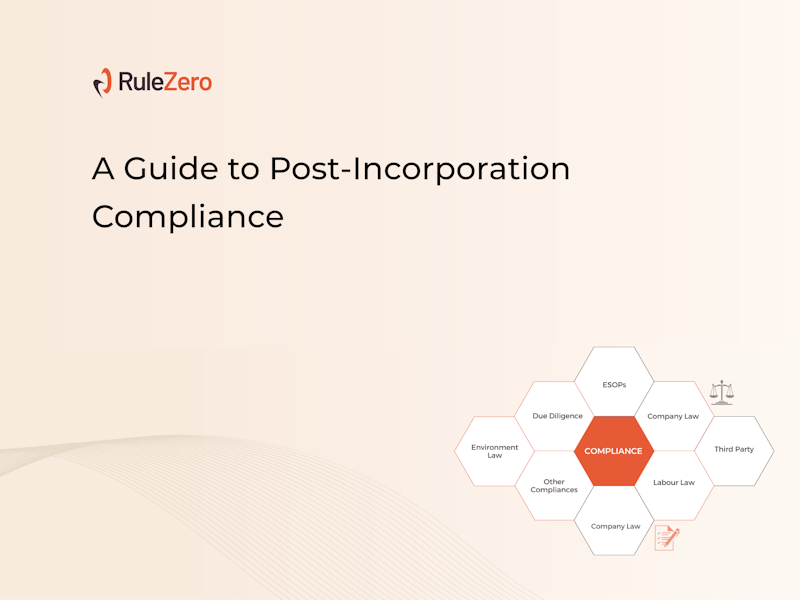Your company has been incorporated! What next?🧐
In our previous blog, we have introduced you to the procedures that go into setting up a Company in India. However, the incorporation process does not end there. Once your company has been legally established, there are some things you’ll need to do to keep it running smoothly. The specific requirements will depend on the type of business you have and the regulations that apply to it. Think of it like putting the finishing touches on a newly-built house. In this article, we’ll walk you through the post-incorporation compliances you need to know about.
The different types of compliances can be categorized into various groups, as illustrated :

1. Internal Compliances- Companies Act, 2013
a) Board Meeting
The first compliance post incorporation that companies must follow is convening a meeting of the board. The board meeting must be called within 30 days from the date of incorporation. For this, the company has to send out a board meeting notice along with the agenda to all the Directors at least 7 days prior to the date of the meeting.
b) Obtaining THE Certificate of Commencement OF BUSINESS
All companies must have a Certificate of Commencement of business to begin operations. For this purpose, the company must file two declarations with the Registrar that include:
- Form INC 20A- Declaration that all subscribers to the Memorandum of Association have paid for their holding of shares. The declaration must be filed within 180 days from the date of incorporation.
- Form INC 22A- A request to verify the registered office of the company. This is applicable only in case the company did not have a registered address at the time of registration. The form must be filed within 30 days from obtaining the registration.
c) Appointment of Statutory Auditor
The first auditor of the Company must be appointed within 30 days from the Date of Incorporation of the Company. If this does not happen, then the company must appoint an auditor within 90 days from the date of the Extraordinary General Meeting.
An individual or a firm may be appointed as the auditor of the company. The auditor must provide a written consent stating that he/she is eligible for such appointment and the appointment has been made in accordance with the conditions prescribed under the Companies Act.
d) Issue of share certificate
Share certificates must be issued within 60 days from the date of incorporation. This should be issued to all the subscribers to the memorandum who have signed the memorandum of association and contributed towards the initial capital of the company.
Under the Indian stamp Act, stamp duty is payable by the company on the share certificate value in the state where the registered office of the company is located. The stamp duty must be paid within 30 days from the date of the issue of shares. This payment can be made online in the states that allow e-stamping.
E) Disclosure of interest by the director
The first Directors of the company must file Form MBP-1 intimating to the Board about the interest they hold in any other company, association, body corporate, firm etc.
F) Registers
Separate registers have to be maintained to record the details of Shareholders, Debenture Holders and all other security holders. For this purpose, the company has to maintain a (i) register of members (MGT-1); (ii) register of debenture holders (MGT-2); and (iii) register of other security holders. The names of the security holders have to be indexed in the register. In case the shares are held in Demat form, the register maintained by the depository is considered.
2. Employee related compliances
a) Shops and Establishment Act
The Shops and Establishment Act regulates the working conditions for employees in an organization. It basically lays down provisions on- the number of working hours, wages, overtime compensation, leave, holidays and other related provisions for the benefit of employees.
The application for registration can be made online and offline. While taking the Shops and Establishment registration is not compulsory for all companies, you can apply for registration at the time of incorporation using the AGILE-PRO-S form. The application must be submitted with common supporting documents that include:
- Entity details/documents- Certificate of Incorporation, rent agreement, memorandum of association;
- Applicant details/documents- PAN, Aadhaar, driving license and other identity proof of documents;
- Details of authorized signatory- Full name, designation, address etc.
The Labour department of the respective states will review the application and register the establishment issuing the registration certificate and number.
b) Labour laws
Labour laws protect the interests of the employees. As you start hiring employees, it becomes mandatory to follow the applicable statutory labour laws. These laws mostly govern provisions on payment of wages/salary, number of working hours, provident fund, overtime compensation, holidays, leave, gratuity and so on.
Since the number of procedures to be followed to obtain registrations under the applicable labour laws are cumbersome, the Ministry of Labour and Employment along with the Department of Industrial Policy & Promotion have issued a set of guidelines that allow start-ups to submit a self-certified declaration under 6 labour laws.
- Employees State Insurance Act, 1948
- Employee Provident Fund and Miscellaneous Provisions Act, 1952.
- The Payment of Gratuity Act, 1972
- The Building and Other Construction Workers’ (Regulation of Employment and Conditions of Service Act, 1996)
- The Contract Labour (Regulation and Abolition) Act, 1970
- The Inter-State Migrant Workmen( Regulation of Employment and Conditions of Service) Act, 1979
No inspection will be done in the first year of setting up the company if the certificate has been furnished. This allows companies to stay completely focused on their business objectives. However, there are compliance procedures that need to be met. The company has to file returns under the respective labour laws as applicable after the second year upto 5 years from the date of setting up the company.
c) Employment contracts/Agreements
Contracts provide clarity in understanding the scope of work and binds the actions of all the parties involved. As part of the day-to-day operations and conduct of business, there will be interactions with various vendors, clients, customers, employees, contractors for either procuring or performing services. It is important that all key terms discussed with these parties are captured in a well drafted formal contract. Few important contracts include:
- Offer letter: This is the contract entered with the employees of the company. Offer letters set out the terms of the offer, roles, responsibilities, rules etc. It is executed on a stamp paper and stamp duty is payable on the same. The rate of duty varies from state to state. In most states this is Rs.100. Offer letters are typically not stamped though legally it is required.
- Intellectual Property (IP) Agreement: IP agreements set out IP ownership of work done by employees. Under this, the employees agree to grant ownership rights to the company in relation to any developments made using the company resources while in employment with the company.
- Non-Disclosure Agreement(NDA): The NDA has two categories – Mutual and One-Sided. Terms vary according to the type of company and business requirements. The NDA is executed on a stamp paper and stamp duty is payable on the same. The rate of duty varies from state to state. In most states this is Rs.100.
d) Employee Stock Ownership Plan (ESOP)
Companies offer stock options to employees to keep them engaged, motivated and directly tie their efforts to the progress of the firm. To issue ESOP, the companies must first check whether Articles of Association provide for the issue and then the company must have in place an ESOP pool. Further, issuance of ESOP has to be approved by the shareholders and a special resolution has to be passed in this regard. If required, a compensation committee may be set up to plan the terms of ESOP. The size of the ESOP pool is mostly decided based on the hiring plan, the number of employees, number of founders, founding team members and employees to whom you plan to grant stock options in exchange for the services received. A typical ESOP pool ranges from 5% to 15%.
3. Other compliances
a) Import Export Code (IEC)
Application for IEC can be filed either online or offline. In case of online filing, the application can be filed at https://www.dgft.gov.in/CP/ and in case of offline filing, the application can be filed in Form ANF-2A with the Director General of Foreign Trade (DGFT). In case of online submission, the following supporting documents shall be attached:
(i) Company’s bank account details – Banker’s certificate;
(ii) Photograph of applicant;
(iii) Entity details/documents such as certificate of incorporation, date of incorporation, CIN number, PAN copy and extract of board resolution;
(iv) Upload Form 18 in case of change of registered office;
(v) Director details – Upload Form 32 in case of change in directors; and
(vi) Any other document (if required).
The IEC number is the same as the PAN of the firm. However, IEC is separately issued by DGFT.
b) Environmental Laws
The main purpose of the environmental laws is to ensure that the company does not exploit or overuse resources and exceed any pollution standards set by the respective boards on emissions, effluents, generation of waste(hazardous or otherwise) etc.
Similar to labour laws, for startups, the government has issued guidelines wherein the company can submit a self-certified declaration under 3 environmental laws.
- Water (Prevention and Control of Pollution) Act, 1974
- Water (Prevention and Control of Pollution) Cess (Amendment) Act, 2003
- Air (Prevention and Control of Pollution) Act, 1981
Depending on the kind of business you run and the size of your company, the applicable permits under the environment laws have to be obtained.
c) Intellectual Property
The business idea, trade secrets, business and product names, logos, processes, designs, concepts, discoveries, inventions, technology, original works of authorship, know-how, databases, methodologies, software, computer programs, technical information, engineering and technical drawings, and other such knowledge or information developed must be protected from infringement.
In this regard, it is best to apply for registration under trademark, patent, copyright laws at the very beginning to avoid unnecessary hassle in the future.
If the company is registered under the Startup India scheme, the process to obtain the necessary registrations under the Indian Patent Act becomes a lot simpler. The companies will have the advantage of the government bearing the payment to be made for the registration except the statutory fees.
While all of the above provisions look tedious and time consuming, it is best to have all the legal registrations and compliances in place at the very beginning. This will prevent the authorities from knocking on your door and throwing you off track at the very initial stages of the company.
Every year thousands of eggs are laid by turtles on beaches. Of these only few make it to the ocean, survive predation, …
As part of our effort to understand liquidity from different perspectives, we spoke to prominent names in the VC and investor communities. …


.png)






